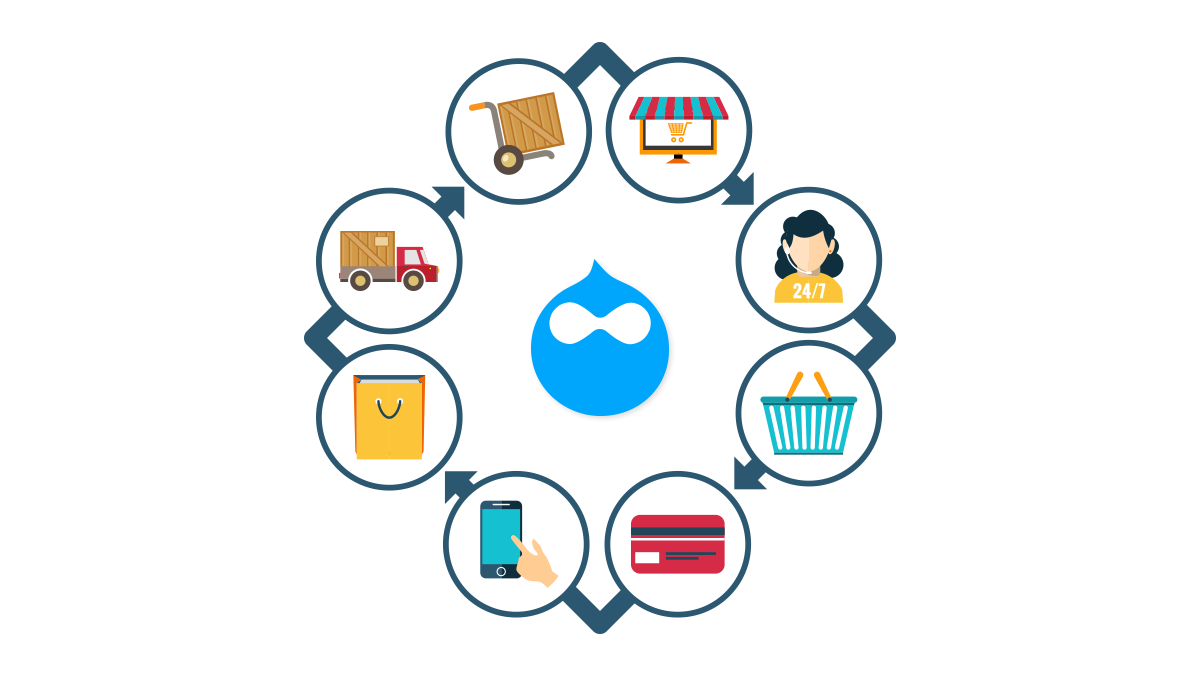
Evolving technologies and marketing strategies have changed the way shopping is experienced. With time, the charm and challenges of eCommerce have increased. How do you plan to overcome these challenges?
As an online brand, you have your challenges when eyeing expansion and opportunities. To achieve the right numbers it is important to engage with customers and sell quality products, all through the right platform.
Talking about the right platform, you can always trust Drupal. Drupal is a content management system with hundreds of modules and themes ready to drive your business online. Drupal adds the magic that your website needs.
The State Of Digital Commerce
Drupal provides amazing features for your eCommerce website, but before jumping to that, let’s take a glance at some stats and understand where the eCommerce industry is heading.
According to Statista, online sales reached $2.5 trillion for the global eCommerce market at the end of 2019 and represented 14% of its global market share. The same data says that by the end of 2020, global commerce sales are predicted to reach $4.2 trillion and the representation will increase to 16%.
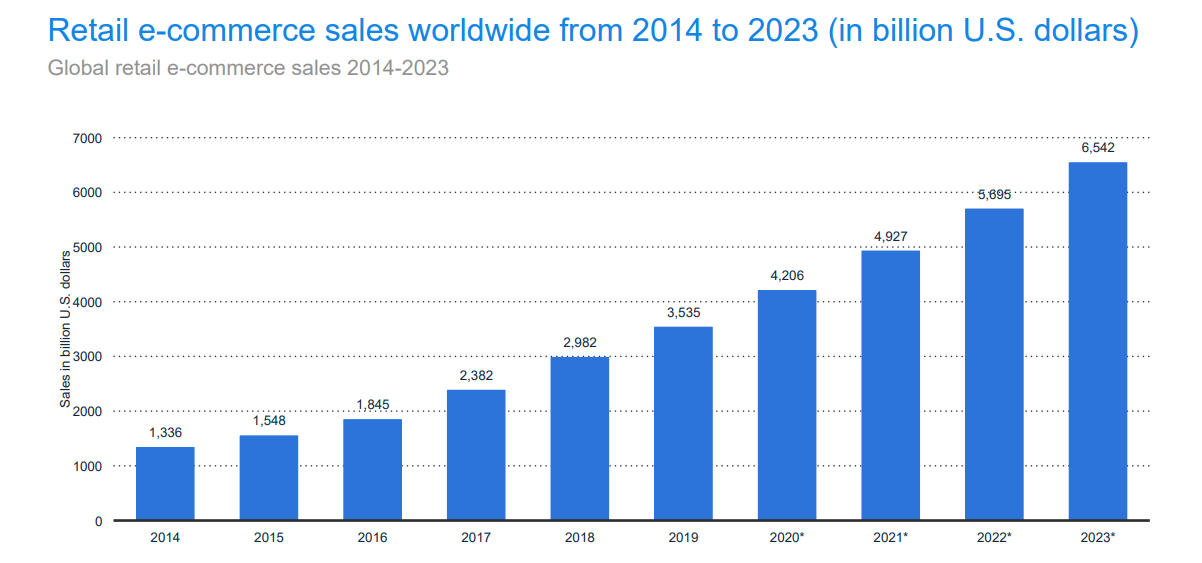
The way that people have been shopping online has changed. Keeping up with trends is important for the growth in the retail landscape of 2020. The future looks bright for eCommerce in the coming time.
Personalization is the key if you want to earn the trust of your customers and give them an experience that makes them come back to your website again. Contactless payment has become the shopping trend and has been continuing for a long time. People prefer paying online instead of cash on delivery. So, providing diverse options for payments is important to keep your customers’ experience a happy one. Subscriptions are an ongoing trend that has helped brands get a lot of long term customers. Similarly, Chatbots have been a great help in enhancing the experience of the users. Experts have predicted that 80% of businesses will be using chatbots by the end of 2020. Voice search has become popular with time. 26.1% of consumers have made a purchase on a smart speaker in 2019.
To leverage all these ongoing trends, and drive sales of your product online, you need a robust and future-ready eCommerce website and Drupal is ready to help!
Why Using Drupal Brings You A Lot Of Benefits
One of the most comprehensive open-source CMSes available, Drupal, is the perfect fit for eCommerce businesses. It gives you the perfect way of modeling your content, integrated marketing, payment, and fulfillment tools, which helps in bringing in a bigger audience. All the features of Drupal are accessible to merchants of every size.
There are so many brands out there using Drupal for their online business. Here are a few of them:
Honda Brazil
The website of Honda Brazil, built using Drupal, gives the users an engaging experience with easily accessible information.

Timex
With the help of Drupal, Timex, a famous American Watchmaker, is able to provide its customers a seamless, engaging, and consistent online experience.
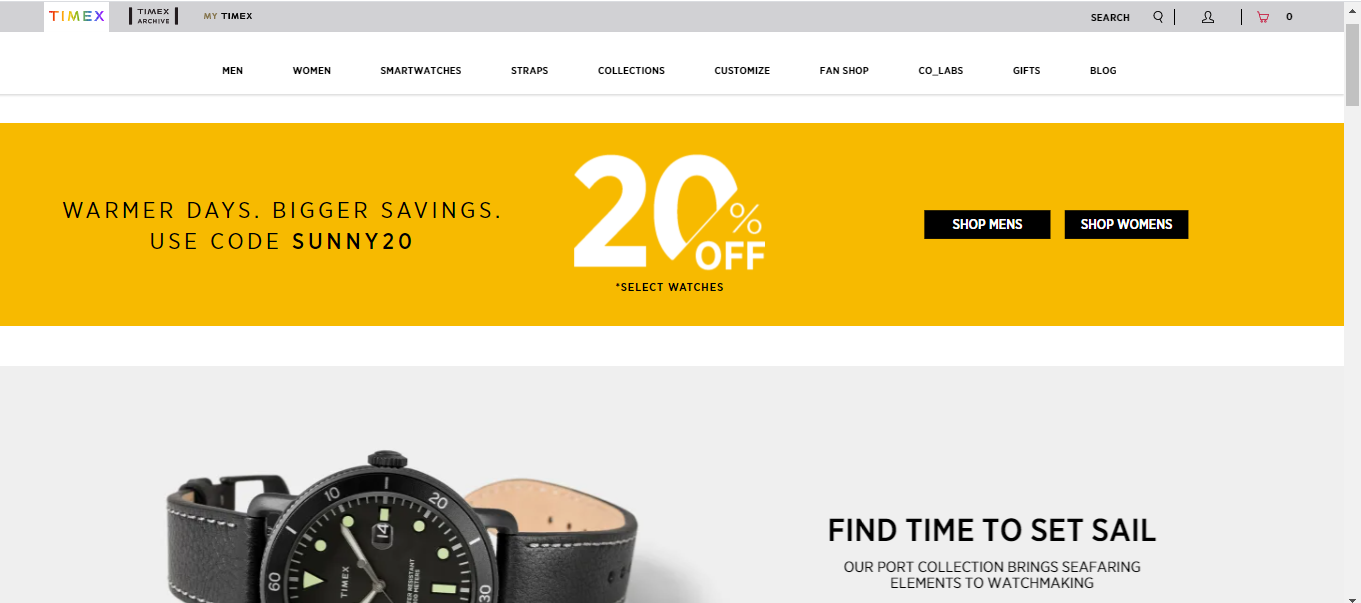
Lush
Lush, with its website powered by Drupal, has seen dramatic spikes in both online and traffic sales.
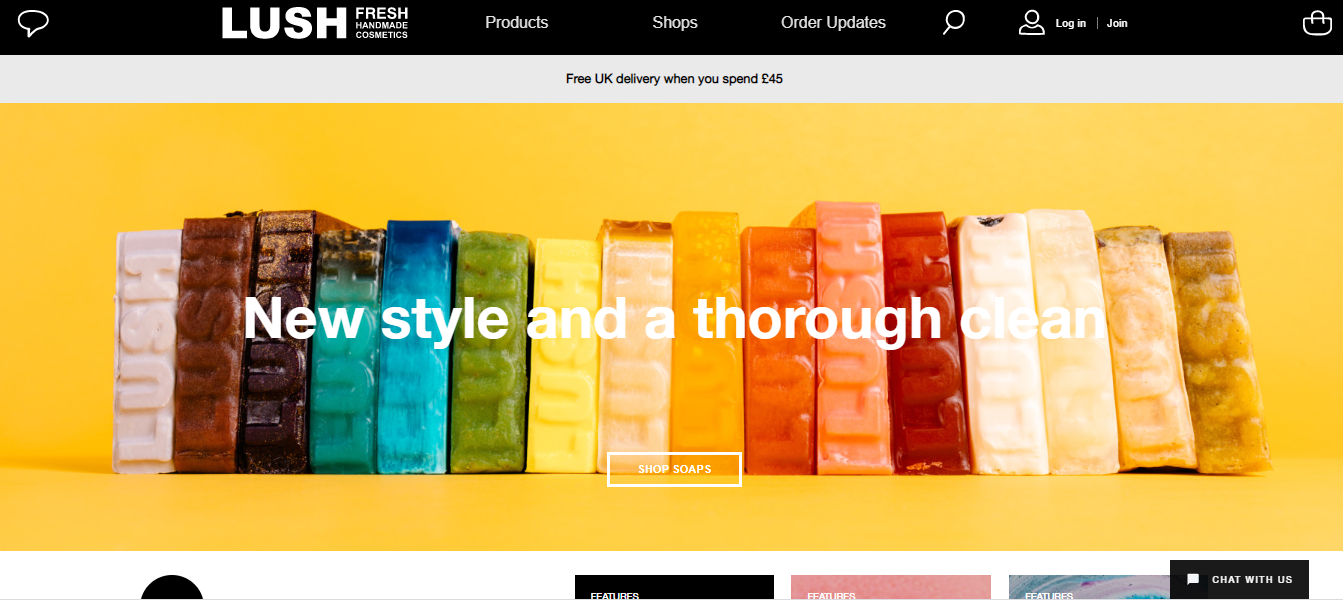
Puma
Puma, one of the leading sports brands, has its website built on top of Drupal.
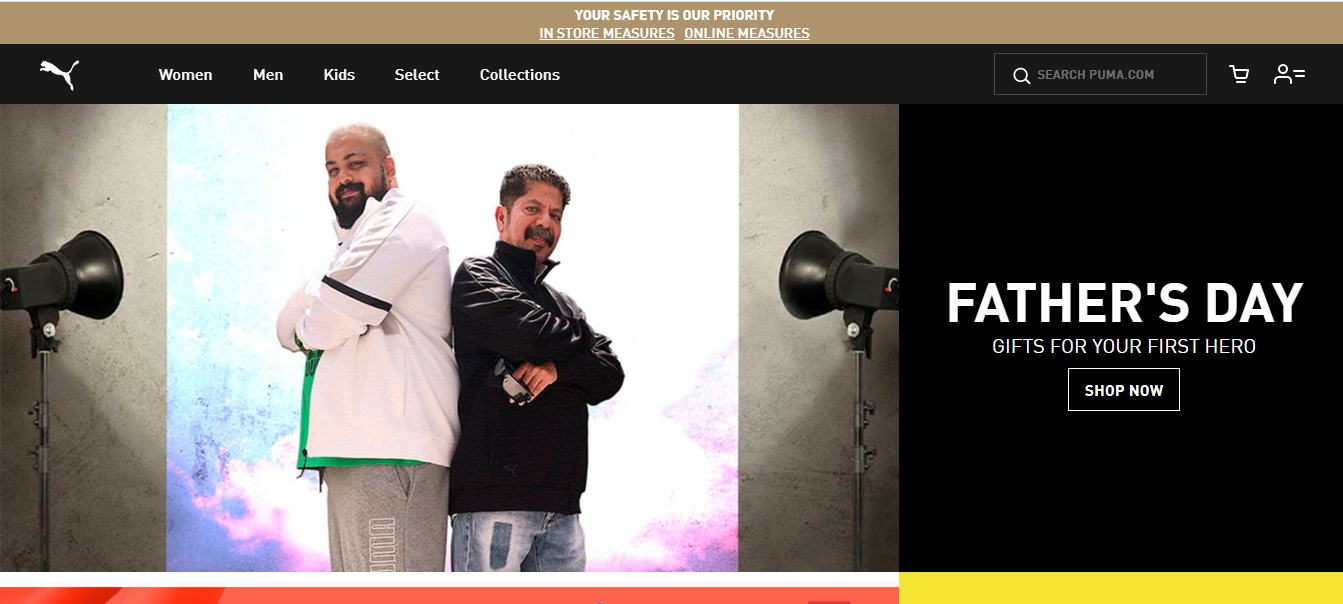
Why do such great brands choose Drupal for their online business? Let’s look at the reasons that show why Drupal is the best fit for your eCommerce website:
Commerce Kickstart
It’s a distribution for the quickest way to get up and running with Drupal for eCommerce features. If you are launching an online store, commerce kickstart is a great resource that will get you up and running with the production environment.
Commerce Kickstart is made for modern PHP lovers and is available only for Drupal 7. The categories in this distribution include shipping and payment providers, data migration, search tools, product catalogs, etc.
Drupal Commerce
Drupal Commerce is a dedicated solution for your eCommerce needs. It is basically a set of modules for Drupal that enable the host of eCommerce features. Drupal Commerce being a framework itself, focuses on the solutions that can be built by using it. In simpler words, Drupal Commerce brings to your website the basic functions like order, product details, cart item, and payment options.
There are many features of Drupal Commerce that are further extended with the help of modules. Here are a few of them:
- Modules like Commerce Stock and Commerce Inventory make inventory management easy.
- Commerce shipping is Drupal commerce contributed module that is used in cases where the shipping address and the billing address is different by making use of the customer profile.
Essential modules for an e-commerce site
There are plenty of Drupal modules that can be added to your eCommerce site and will help you in building intuitive and powerful websites. Here are some of the modules provided by Drupal for eCommerce:
- Commerce Shipping takes care of the shipping rate calculation system for Drupal Commerce. It is used with the combination of other shipping method modules like Commerce Flat Rate, Commerce UPS, etc.
- The Currency module helps your website with currency conversion and information and does the work of displaying the price of the product.
- Commerce Stripe makes sure that the customers can pay securely without having to leave your website.
Essential themes for an e-commerce site
The first thing that attracts a user when they visit your website is the appearance of your website. Drupal provides amazing themes for your eCommerce websites which come in handy.
- eStore is Bootstrap based and easy to install and is designed in a way that it solves any eCommerce website’s needs.
- Flexi Cart is a global theme that makes sure that your products sell fast and easily online.
- Belgrade is a Drupal Commerce template specially designed to create business websites.
- SShop is among those Drupal 8 themes which are responsible for providing the users with inbuilt support for Drupal Commerce.
Content-Driven Commerce
Content marketing is the most popular way and for sure gets you the best SEO results. A good story behind your brand will definitely drive sales for you. If the content on your website is engaging, the users will keep coming back to your website.
The stories can be anything that relates to your product. For example, if you are selling lipsticks, you can write an article that says which shade is the perfect one for your different colored outfits.
It is really important to decide the kind of content you want to post on your website. Your content can include blog posts, ebooks, guides, tips, hacks, etc.
Drupal covers the need for content-driven experience. No matter what the case may be, content types are at the core of Drupal that include, mobile editing, in-place authoring, easy content authoring, content revisioning and workflows, and modules for multimedia content.
Headless Commerce
Headless Commerce, which acts as a great catalyst to upscale content-driven commerce, gives immense flexibility to create a great shopping experience for the users. It is future-focused and stays relevant. JavaScript interface communicates with backend Drupal via REST API. Also, in Decoupled Drupal, there is a separation between the presentation layer and eCommerce backend.
Headless Drupal commerce comes with a lot of benefits including high speed, interactive features, and freedom in front-end changes. These features provide a great shopping experience to the customers online by providing a content-rich experience.
Read our article on the implementation of Decoupled Drupal Commerce and React Native to learn more about the benefits of a headless commerce approach.
Performance
It is important to take into account the speed of your website. It is seen that a site that loads in five seconds has 70% longer average conversions. A slow website will deter your efforts and investments. 79% of the shoppers who faced the slow- loading issue say that they don’t return to the websites. These bounces bring a direct effect on revenue generation.
To maintain a top-notch web performance, Drupal comes packed with plenty of offerings. Some of them include:
- Blazy module helps the pages load faster and saves data usage if the user is not using the whole page.
- CDN module helps with the integration of Content Delivery Network for the websites and mitigate the page load time and rapidly deliver the web page components
- In case, your server hardware is reaching its limits, Drupal gives you the option to upgrade the server hardware for a faster way of scaling.
Mobile Ready
If your website runs smoothly on mobile devices, it will be able to run better on other devices too! Creating user scenarios will help you understand what kind of content the user will appreciate on their mobile. This approach will help you design the important elements required for your website.
Mobile compatibility has become an irreplaceable feature for any eCommerce site. In today’s world, everything needs to be mobile-ready. Drupal’s websites not only wow the clients by their looks but also by their mobile responsive design. Drupal websites are easily accessible on mobile and tablets.
Multilingual
The world is on the internet, and with so many people using similar platforms and so many brands expanding globally, multilingual websites are the sine qua non!
China has the highest number of internet users which is a massive 772 million. Although the maximum number of people on the internet prefer English as their language, 10 other languages that account for 90% of the top 10 million websites.
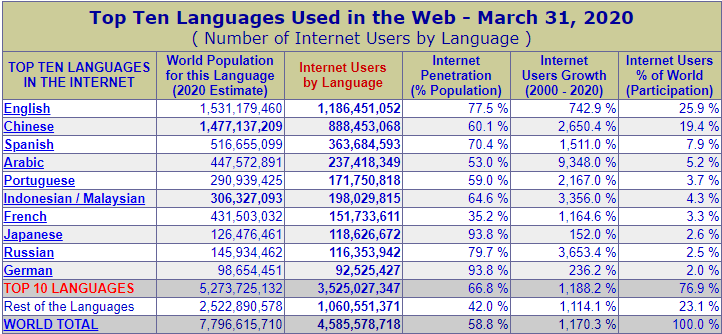
Drupal is the best choice for your multilingual website. It provides numerous languages to choose from and 4 core modules specially designed for language and translation support. This feature by Drupal has shown great results that include higher conversions, rise in SEO, unrivaled translation workflows and has also been a great help in widening the audience. It also allows the detection of the user’s preferred language by identifying users’ IP address, sessions, browser settings, etc.
Personalization
Every eCommerce brand wants to make sure that the content created by them leaves a mark on the users’ minds. And it has become a necessity today because there is a lot of competition out there. Hence, personalized content makes the user experience better and helps create trust between you and the customer.
According to an Adobe report on personalization, 92% of the B2B marketers say that personalization is important.
This is the marketing opportunity that no eCommerce business should miss out on. Tapping the different demographics and varied audiences not only improves your market reach but your bottom line as well.
Following are examples of modules that can aid your web personalization efforts:
- The Smart Content module gives real-time anonymous personalization for the users. It also allows the site administrators to display different content for anonymous users based on browser conditions
- Acquia Lift Connector module helps organizations in delivering personalized content and experience across all platforms and devices by merging content and customer data into one tool.
SEO
E-commerce websites are buried with huge data. While for a consumer, it might be a desirable situation, for a marketeer it increases the burden of implementing SEO on every page and indexing every product.
Drupal has various modules that help in improving the SEO of your eCommerce website. Some of them are:
- Pathauto is an SEO module that ensures that the URL of your website is search engine friendly. It converts complex URLs to simpler ones.
- Metatag module is a multilingual module and controls all the metatags on all the web pages.
- XML Sitemap module provides you the resilience to exclude or include a few pages on your Sitemap.
Security
With the increase in cases of hacking and security breaches, basic security do-it-yourselves are not sufficient. The security breaches affect your brand image and your market shares and stock price. According to a report, more than $3.5 Billion was lost to Cyber Crime in 2019.
Drupal has a dedicated team that regularly works on the security side of it. It is frequently tested for issues and bugs. Drupal also provides various security modules for your eCommerce website. Some of them are:
- The Password policy module provides the password policies that help users to create a strong password. The password entered by the user is not accepted until it meets the constraints set by this module.
- Security Kit module provides various security- hardening options. This helps in reducing different risks coming from different web applications.
- Two-factor authentication module is a second step for your security check, where a set of codes is defined for a user to be able to sign in.
If you open a webpage from your mobile device and at the same time open it on your PC/laptop, you will be forced to close one of the pages. The session limit module does the same work of limiting the number of sessions by a user at the same time.
To Sum Up
The substantial development in the concept of ‘eCommerce’ has kept the online brands on their toes. And this is where Drupal provides its unmatched services for your eCommerce platform.
Be it building your eCommerce website or migrating to Drupal, we at OpenSense Labs will help you do your job smoothly until you get a desirable finish.
Feel free to contact us at [email protected] to drive sales on your website!
Subscribe
Related Blogs
Back from DrupalCon Atlanta 2025: A Milestone Moment for OpenSense Labs

“Fit. Fast. Built to Last.” That wasn’t just a tagline, it was the mindset we brought to DrupalCon Atlanta 2025. And judging…
Explainable AI Tools: SHAP's power in AI

Do you know what are explainable AI tools? Explainable AI tools are programs that show how an AI makes its choices. They help…
AI Chatbot: Crafting with Precision & Personality

In the realm of artificial intelligence, developing an AI chatbot that not only delivers accurate information but also…




